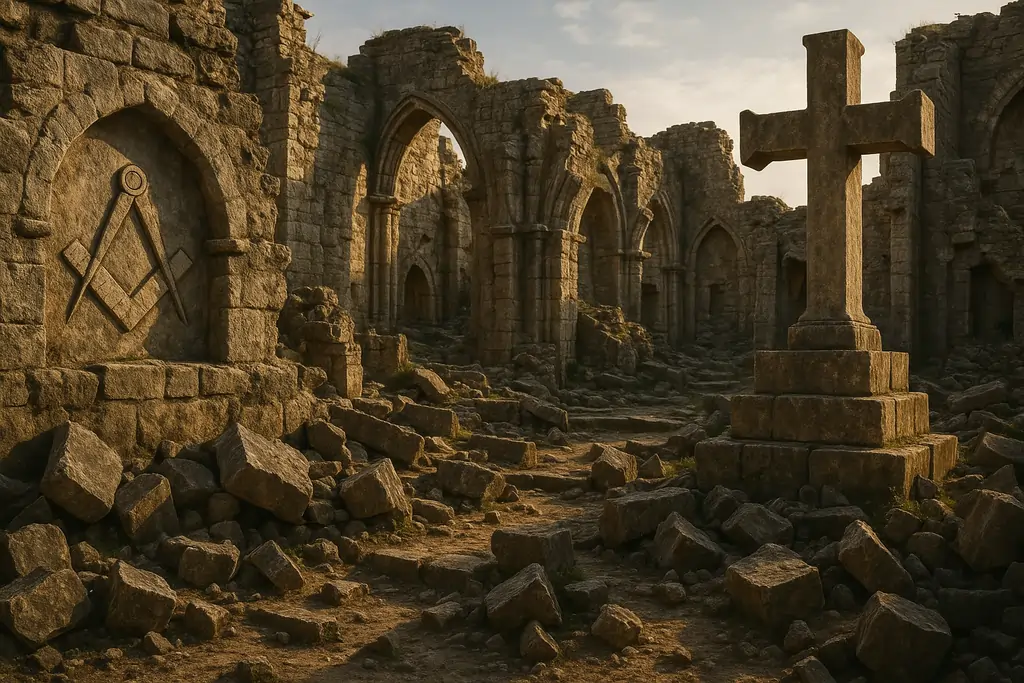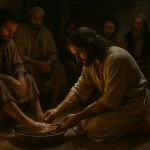- 1. Theological Clarity: Allegiance Must Be to Christ Alone
- 2. Spiritual Secrecy and the Allure of Gnosticism
- 3. Fracturing the Body: From Brotherhood to Segregation
- Biblical and Evangelical Reflections
- D. Oaths and Review
- 4. The Call to Gospel Simplicity and Missional Focus
- 5. Pastoral Integrity and Testimony
- Conclusion: For the Sake of the Body and the Name of Christ
The National Association of Christian Ministers (NACM) affirms unity in the gospel and clarity in our testimony as foundational to our ministry call. While we recognize the historical and personal complexities surrounding organizations such as the Masonic Lodge and the Knights Templar, we must respectfully and decisively state that these groups are not recognized as partners in ministry by the NACM. This position is rooted not in ignorance, nor hostility, but in a commitment to the integrity of Scripture, the visible unity of the body of Christ, and the safeguarding of gospel clarity.
1. Theological Clarity: Allegiance Must Be to Christ Alone #
Scripture is unequivocal about where our ultimate allegiance lies. Jesus said, “No one can serve two masters” (Matt. 6:24), and Paul warned the Corinthians, “You cannot partake of the table of the Lord and the table of demons” (1 Cor. 10:21). While we do not claim that all Masonic or Templar rituals are inherently demonic, the concern lies in the dual allegiance these systems often require.
Organizations that require secret oaths or elevate symbolic hierarchies parallel to the church blur the spiritual clarity that Christ alone is Lord. Even symbolic roles such as Grand Prior, Knight Templar, or Worshipful Master can distract from the servant-leadership modeled by Jesus (Mark 10:42–45). Even if used in innocence titles that Christ did not institute create confusion about who truly governs the church.
2. Spiritual Secrecy and the Allure of Gnosticism #
Gnosticism—an early heresy rebuked by the apostles. It thrived on the idea that salvation or spiritual maturity could be accessed through secret knowledge (gnōsis). Paul combated this in Colossians, affirming, “In [Christ] are hidden all the treasures of wisdom and knowledge” (Col. 2:3), and warning, “Let no one disqualify you… going on in detail about visions… not holding fast to the Head” (Col. 2:18–19).
Modern Masonic or neo-Templar systems often appeal to this hidden wisdom (progressive rituals, coded language, esoteric symbols) presented as spiritual enlightenment. While they may profess to be supplemental, such frameworks risk replacing public revelation with private initiation, undermining the sufficiency of Scripture (2 Tim. 3:16–17).
True Christian discipleship is not hidden behind veils but lived in the open. Even the veil in the Temple (often attributed to Solomon) was torn from top to bottom when Jesus was crucified (Matt 27:51). Jesus also said, “I have spoken openly to the world. I have said nothing in secret” (John 18:20). The gospel is not reserved for an inner circle but proclaimed to all nations (Matt. 28:19–20).
3. Fracturing the Body: From Brotherhood to Segregation #
Paul’s urgent plea to the Corinthians was, “I appeal to you, brothers… that there be no divisions among you” (1 Cor. 1:10). Yet organizations that separate members into secret ranks or hierarchical titles inherently segregate the body rather than unify it. The church, as Christ’s bride, is built on one Spirit, one Lord, one baptism (Eph. 4:4–6), not on fraternal orders or military symbols.
Even where the intent is honorable; such as a desire to honor tradition or protect values, these systems often lead to parallel loyalties, special initiations, and stratified relationships that fracture the simplicity of the gospel. By their very structure, these orders create an insider-outsider dynamic that contrasts sharply with Jesus’ command, “Whoever would be great among you must be your servant” (Matt. 20:26). To deepen this point, we must consider what happens when such groups, like the medieval Knights Templar, influence our modern perceptions of ministry identity. Their legacy highlights the risk of merging sacred faith with secular power.
Biblical and Evangelical Reflections #
A. War and Witness #
Templars represent a Christian militarism foreign to the New Testament ethos. While they professed loyalty to Christ, their identity as warrior-monks blurred the line between gospel mission and military conquest. Jesus plainly said, “My kingdom is not of this world. If it were, my servants would fight…” (John 18:36).
Evangelicals rightly wrestle with the idea of sword-bearing saints. The early church was marked by martyrdom, not militancy. The Templars, however, embodied a medieval synthesis of empire and church. This is something neither Christ nor the apostles ever modeled or endorsed.
B. Vows and Power #
Though their vows mimicked humility, the Templars often succumbed to political ambition and ecclesiastical privilege. Their wealth, authority, and direct access to the papacy placed them at the center of church-state intrigue. Paul’s warning is hauntingly relevant: “They have a form of godliness but deny its power…” (2 Tim. 3:5). When Christian identity becomes entangled with hierarchy and conquest, the gospel itself is obscured.
C. Legacy of Faith or Folly? #
Were the Templars truly protecting the faith or confusing it with temporal dominion? Their dramatic rise and fall challenge us to reconsider the wisdom of mixing spiritual calling with worldly institutions. “Unless the Lord builds the house, those who build it labor in vain” (Ps. 127:1). The evangelical commitment to gospel clarity and servant leadership stands in stark contrast to the Templar model of militarized spirituality.
D. Oaths and Review #
In light of Matthew 5:37: “Let what you say be simply ‘Yes’ or ‘No’; anything more than this comes from evil.” Jesus directly challenges the kind of secretive oath-taking that has historically characterized groups like the Freemasons or the Knights Templar. These societies often rely on layered pledges, and secret initiations that go beyond plain speech. While such vows may appear noble or binding, Christ calls His followers to a radically different ethic: one of unadorned honesty and visible integrity.
Freemasonry, for example, emphasizes moral teachings through allegory, often requiring members to swear solemn oaths of secrecy and loyalty. Similarly, the Knights Templar was originally a medieval military order who were known for their complex codes and sworn brotherhood. But in the Sermon on the Mount, Jesus reframes all such forms of religious or fraternal obligation. He declares that the true mark of a disciple is not veiled promises but transparent speech: a simple “yes” or “no” that reflects inner truth. This kind of truthfulness leaves no room for dual allegiances or hidden meanings. Anything beyond that, Jesus warns, “comes from evil.”
James 5:12 affirms this with even more urgency: “Do not swear, either by heaven or by earth or by any other oath… so that you may not fall under condemnation.” The early church understood that Christian identity must be free from entanglement in systems that blur moral clarity or substitute secrecy for sanctification.
To follow Christ, then, is to speak plainly, to live visibly, and to reject oaths that compromise the call to truth. This does not demonize all historically tied to groups like the Templars or Freemasons. However, it does call their systems of hidden vows and layered allegiances into question. All the more when they conflict with the open, Spirit-led witness of the gospel.
4. The Call to Gospel Simplicity and Missional Focus #
The early church thrived not because it had access to special symbols, but because it was empowered by the Spirit and rooted in the Word. Paul deliberately avoided high-sounding mysteries when ministering: “I decided to know nothing among you except Jesus Christ and him crucified” (1 Cor. 2:2).
Our mission as ministers is not to mystify the faith, but to proclaim it plainly (2 Cor. 4:2). Whether ancient, fraternal, or romanticized systems, rituals that distract from the gospel can inadvertently shift attention from Christ to human ceremony. The NACM embraces a public, Spirit-led ministry model that equips everyday believers for mission without cloaked titles or ranks. We believe every disciple is a priest (1 Pet. 2:9), and the church is Christ’s temple; not a lodge, a commandery, or a castle.
5. Pastoral Integrity and Testimony #
Paul exhorted Timothy, “Keep a close watch on yourself and on the teaching” (1 Tim. 4:16). For those who have belonged to such groups, we understand the personal struggle of parting ways. But as ministers of the gospel, we must not be “entangled in civilian pursuits” (2 Tim. 2:4), especially if they cause weaker believers to stumble (Rom. 14:21).
It is not enough for something to be morally neutral. Paul writes, “All things are lawful… but not all things build up” (1 Cor. 10:23). If participation in secret orders leads to public confusion, private pride, or spiritual distraction, it should be humbly laid aside.
Conclusion: For the Sake of the Body and the Name of Christ #
The National Association of Christian Ministers respects the personal journeys of all believers. We do not condemn those with past involvement in Masonic or Templar systems. But for the reasons above—biblical clarity, gospel unity, spiritual transparency, and pastoral testimony—we cannot endorse such affiliations as compatible with ministerial partnership. We choose instead to walk in the light, where Christ is all, and in all (Col. 3:11).









